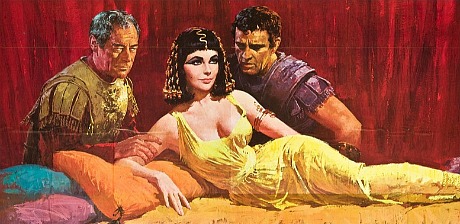Last Tuesday Deadline‘s Michael Fleming outlined the latest configuration of Sony’s Cleopatra biopic — Angelina Jolie in the lead, David Fincher possibly directing, Scott Rudin producing from a script by Brian Helgeland (but with a new punch-up writer possibly being sought), based on Stacy Schiff‘s Cleopatra: A Life. An inside source says it’s all “conjecture” at this point, but I’m hearing the project may actually come together.



A guy I don’t know much less trust directed me to an IMDB comment posting, allegedly written by someone in the loop, claiming that (a) Fincher is “almost confirmed,” (b) “Filming to begin late in the year (Malta, Cyprus or Egypt),” (c) “The roles of Julius Caesar and Marc Antony to be given to ‘no big stars,'” presumably because the intent is for Jolie to dominate and be central to the proceedings in every conceivable way, (d) “Brad Pitt was never considered for the role of Marc Antony”…THAT WOULD HAVE BEEN TOTALLY RIDICULOUS!, (e) “The film will be a political epic,” and (f) “Expect a fabulous work of make-up…Angelina to appear completely unrecognizable.”
This last bit of possibly imagined information is the most interesting to me. Cleopatra was not a ravishing beauty, by all historical accounts. The idea of Jolie making herself look a wee bit homely with a different nose or something sounds highly intriguing. It worked for Nicole Kidman in The Hours. When’s the last time a world-famous actress significantly altered her looks to portray a head of state? When Bette Davis had her head shaved for The Virgin Queen?
I’ve read about how this would be “the first telling of the Cleopatra story from a woman’s perspective” and that “instead of simply being a seductress, as she was portrayed by Elizabeth Taylor in the 1963 Joseph L. Mankiewicz-directed film, Cleopatra is also a shrewd politician, strategist and warrior, with sexual charisma to spare.”
What? Mankiewicz and Taylor’s Cleopatra wasn’t just some titillating queen who wore heavy mascara. She was written and portrayed as a complex combination — seductress, clever politician, willful negotiator, perceptive reader of character, something of a battle strategist. So we’re going to have to hear a bit more about the new version to be persuaded that it’s going to be a markedly different thing than 20th Century Fox’s “monumental mouse,” as critic Judith Crist called it in her review.

Here’s how I put it to a friend this morning:
“I’ve been in denial about Sony/Rudin’s Cleopatra project, and now I’m finally facing it full-on: David Fincher, my hero, might actually direct this? Wow.
“Whatsername’s source book is entirely respectable, and there certainly ought to be room for another take on the Cleopatra saga, etc. But — it might as well be faced and dealt with straight-on — the stink from Joseph L. Mankiewicz’s 1963 turkey, despite Rex Harrison‘s superb performance and other stirring and agreeable aspects, is, 48 years after the fact, still lingering in the air. And so there’s a slight feeling of ‘uh-oh’ or at least ‘oh…really?’ when you hear about a Cleopatra feature.
“Plus I have to wonder how persuadable Jolie, a tabloid queen to millions, can be in a historical context? I’m thinking of my reaction to her as Alexander the Great’s mom in Oliver Stone‘s film. But if they make her look a bit homely, maybe.
“I’m just being honest and open here. Rudin’s project, image- and expectation-wise, has to overcome the stigma of the 1963 film, and that in itself, however unfair, is going to be a bit of an endeavor. And I’m also asking myself how Fincher, a modernist and/or futurist and a digital guy who’s never gone further back in time that early 20th Century New Orleans, is going to find his way into an exotic 2000 year-old culture…the mind reels.
“I’m not slagging this project at all. I’m just being upfront and honest about the associations that people have with the name ‘Cleopatra,’ etc. If anyone can turn the image around, it’s Fincher and Rudin…don’t get me wrong. But the image does need turning around because everyone in the media remembers what a catastrophe the ’63 version was….that’s all I’m saying. Obviously doable. An educating process required.”












